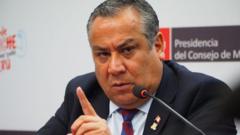The recent sentencing of ex-Prime Minister Ali Laarayedh to 34 years in prison for terrorism charges marks a significant event in Tunisia's political landscape, highlighting concerns over the direction of governance under President Kais Saied.
Former Tunisian Prime Minister Sentenced to 34 Years on Terrorism Charges

Former Tunisian Prime Minister Sentenced to 34 Years on Terrorism Charges
A court in Tunisia has imposed a severe sentence on Ali Laarayedh amid allegations of politically motivated trials.
In a dramatic turn of events, a Tunisian court has handed former Prime Minister Ali Laarayedh a staggering 34-year prison sentence on multiple terrorism counts. The 69-year-old leader of the Ennahdha party, known for its Islamist stance, is seen as yet another high-profile critic of President Kais Saied to face legal action, prompting allegations of "sham trials" proliferating throughout the nation.
Laarayedh's verdict follows claims that he and seven associates operated a terrorist cell and facilitated young Tunisians in joining Islamist militants in Iraq and Syria. In a letter to the court's prosecutor prior to his sentencing, Laarayedh insisted, "I am not a criminal... I am a victim in this case." His defense rests on a consistent denial of wrongdoing and the assertion that the charges are rooted in political motivations.
His sentencing adds to a troubling trend, as over 40 of Saied's opponents—including journalists, diplomats, and legal professionals—have been imprisoned in recent weeks. Critics argue that these trials underscore the president's increasing authoritarian grip on the judiciary after he dismissed parliament in 2021 and began to consolidate power via decree.
Laarayedh was taken into custody three years prior, with human rights organizations advocating for his release. They argue the situation exemplifies how Saied's administration seeks to suppress voices of dissent, particularly those linked to the Ennahdha party, which played a substantial role in Tunisia's brief democratic governance following the Arab Spring in 2011—a movement ignited by the tragic self-immolation of Mohamed Bouazizi protesting systemic corruption.
Despite facing backlash for his administration’s actions, President Saied maintains that he is combating “traitors” and addressing "egregious foreign interference." As the situation continues to unfold, many Tunisians express a sense of lost democratic progress under the current regime.
Laarayedh's verdict follows claims that he and seven associates operated a terrorist cell and facilitated young Tunisians in joining Islamist militants in Iraq and Syria. In a letter to the court's prosecutor prior to his sentencing, Laarayedh insisted, "I am not a criminal... I am a victim in this case." His defense rests on a consistent denial of wrongdoing and the assertion that the charges are rooted in political motivations.
His sentencing adds to a troubling trend, as over 40 of Saied's opponents—including journalists, diplomats, and legal professionals—have been imprisoned in recent weeks. Critics argue that these trials underscore the president's increasing authoritarian grip on the judiciary after he dismissed parliament in 2021 and began to consolidate power via decree.
Laarayedh was taken into custody three years prior, with human rights organizations advocating for his release. They argue the situation exemplifies how Saied's administration seeks to suppress voices of dissent, particularly those linked to the Ennahdha party, which played a substantial role in Tunisia's brief democratic governance following the Arab Spring in 2011—a movement ignited by the tragic self-immolation of Mohamed Bouazizi protesting systemic corruption.
Despite facing backlash for his administration’s actions, President Saied maintains that he is combating “traitors” and addressing "egregious foreign interference." As the situation continues to unfold, many Tunisians express a sense of lost democratic progress under the current regime.



















